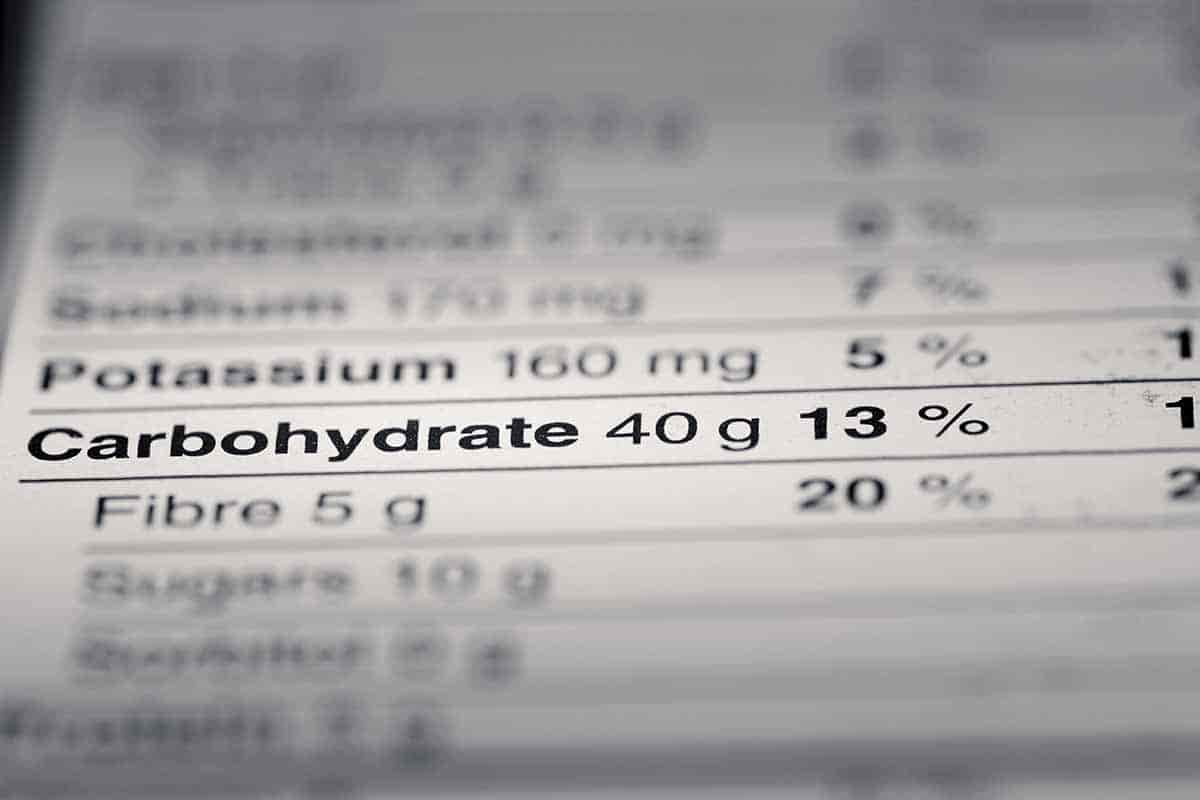If you are familiar with even basic nutrition, chances are that you have heard of carbohydrates, or carbs. Carbs are an essential nutrient needed to help fuel our bodies. However, if not taken into account, they can do more harm than good. So, what is the difference between healthy and unhealthy carbs?
As a general rule, complex carbs are more healthy than simple carbs. While complex carbs provide energy, fiber, and more, simple carbs digest quickly and can go straight to your fat stores if not used.
Continue reading to learn everything you need to know when comparing healthy vs. unhealthy carbs. Carbohydrates are a great source of energy when eaten and used properly, but failure to take advantage of your carb intake can lead to health problems.
Article Contents
What Are Carbohydrates?
Carbohydrates are macronutrients, meaning that they are one of the main components that provide your body with the energy to function properly and stay healthy. Carbs consist of fiber, starches, and sugars.
As you take in carbohydrates, your digestive system converts the nutrients into glucose for energy expenditure. If you eat too many carbs, however, your body might react in a way that is detrimental to your health. Too many carbs can lead to high blood sugar and excess fat stores, so it is important to learn how exactly carbs work when they are in your body.
There are two main types of carbs: complex carbs and simple carbs. Think of complex carbs as healthy carbs and simple carbs as unhealthy carbs. When thinking of what carbs are and how your body reacts to them, you must consider the three types of carbs listed below.
Fiber
Fiber is an essential nutrient found in plant-based foods and whole-grain options. It is a complex carb with several benefits. The most advantageous attribute that fiber has is its ability to aid digestion.
Our bodies cannot digest fiber, so as it moves through our bodies, it helps stimulate digestion for other foods in our stomachs. Fiber has also been shown to regulate your blood sugar. If you eat too many simple carbs, your blood sugar levels can skyrocket. If this is a problem, eating fiber is a great way to help bring those levels back down. It is also good for lowering cholesterol.
As with the other carbs that will be discussed, fiber is very filling. This can be good for eating fewer calories with more macronutrients, but, as you will find shortly, too many carbs – even complex carbs – is not always a good thing.
Starches
Starches are another complex carb that can be very beneficial for you and your body. Carbs in the form of starches contain the most nutrients to help nourish your body. With a huge amount of vitamins and minerals, eating starches allow you to get most of the energy you need throughout the day.
As said before, your digestive system breaks down carbs and converts them into glucose to fuel your energy levels. Since starches contain so many extra nutrients, they can be a great source of energy. However, foods with starches tend to have a lot of calories, so you must be careful when counting how many carbs you eat.
If you do not utilize the energy provided to your body from carbohydrates, the glucose will make its way into your fat stores. If you eat a large meal consisting of a lot of carbs, you must make sure to take advantage of your energy levels once the carbs have been digested.
Sugars
Sugars are simple carbs, and while sugar can help your diet, too much of it often leads to weight gain or other health problems.
You have probably heard of a sugar rush before, right? Well, sugars are simple carbs that can be digested much more quickly than complex carbs. As a result, the carbs will be converted into glucose extremely fast and make your blood sugar levels rise quickly.
While this might sound like a good thing for a time when your body could use energy, it may not be what you think. After your blood sugar levels rise higher than normal, they will drop much lower than they are supposed to, making you feel tired, inactive, etc.
Once the glucose has already done its job, you might not have had time to use the energy you got. Thus, the glucose will go to your fat stores. Consuming things like candy, ice cream, and soda puts you at risk of taking in way too many simple carbs at once.
Why Does Our Body Need Carbohydrates?
So, if there is such a fine line between healthy and unhealthy carbs, why does our body need both? Before getting into this, you should learn about counting your carbs. As with any other tracking of a healthy diet, it is important to be aware of how many carbs you are eating daily. Simply by reading nutrition labels, you can monitor the complex and simple carbs you take in.
Complex carbs are one of our main sources of energy. As macronutrients with loads of vitamins and minerals, they convert to glucose for energy and help your body fight common health issues such as high cholesterol, high or low blood sugar levels, and various heart diseases.
Simple carbs can also be good in some circumstances, though you should be eating substantially less simple carbs than complex carbs. Simple carbs can help when you need energy quickly, though the refreshing taste of that cola you drink is all for nothing if you are not ready to release energy.
If you take in more carbs than you burn off, the carbs go directly into your fat stores. This is why it is so important to count your carbs. Weight gain alone can be dangerous enough, but added risks include:
- Heart disease
- High or low cholesterol
- High or low blood sugar levels
- Diabetes
It may be a bit unclear how eating too many or too few carbs can lead to these problems. If you have further questions about your specific diet, you should contact your doctor and consider getting in touch with a professional nutritionist.
What Are The Healthiest Carbs To Eat?
You already know that complex carbs are the healthier option when choosing what to eat. However, simple carbs have their benefits. As a rule of thumb, you should always be eating more complex carbs than you are simple carbs.
In any case, too much of a good thing can be a bad thing. Even if you are strictly eating complex carbs for your daily carbohydrate intake, you must still make sure you are not eating too many.
Unless you are extremely active and need energy 24/7, you should limit your carb intake. And, for the record, rest is equally important as a healthy diet. Carbs should not be taken to raise your energy levels without practical reason.
Which Carbs Are Good For Weight Loss?
Complex carbs are better for maintaining or losing weight than simple carbs. As you know, simple carbs pose a high threat to rapid weight gain. Complex carbs can present the same problem, but you have a much larger time frame to burn off the calories.
The bottom line is that if you are trying to lose weight while incorporating carbs into your diet, you should be burning off more energy than the carbs that you eat. Similar to burning off more calories than you eat in total, you can track this by reading nutrition labels and doing further research into how your body type reacts to and burns carbohydrates.
Some people choose to partake in different diets that lack carbs, such as the ketogenic diet. There is a huge debate on whether or not this diet can be useful, mainly because the results are so varied. The basic idea of a keto diet is that by not eating carbs, your body is forced to find energy some other way.
While protein can be useful in this situation, you probably do not have enough inside of you at your body’s disposal. So, your body breaks down your fat cells and uses them for energy.
For those looking to have as balanced of a diet as possible, something like a keto diet may not be for you. In other cases, it might be worth a shot. Keep in mind, however, that some people love it, and some people do not have any noticeable changes.
Especially if you do not have enough fat to supply your body with energy, a keto diet might result in your body eating away at itself in an attempt to stay healthy.
What Are The Best Carbs To Avoid?
You should avoid eating or drinking an excess of simple carbs. Sure, having a soda once or twice a week is not going to kill you, but testing the limits of your diet too harshly can have major health effects.
Our bodies do not necessarily need simple carbs, so if you are up for it, try to completely avoid foods with simple carbohydrates.You should also take note of the complex carbs you take in. While they are one of the main sources of energy for your body, you should avoid eating too many of any type of carb. Again, a balanced diet is the best diet.
What Foods Have No Carbs?
If you want to avoid carbs altogether, there are plenty of foods without carbs that still have their own attributes to keep your body healthy. If you are not as serious about it, you can also choose low-carb foods in place of foods you might eat that have a lot of carbs.
Below is a list of both foods with no carbs and low-carb foods that can act as substitutes for your daily, carb-loaded foods:
| Foods With No Carbs | Low-Carb Foods And What They Can Replace |
|---|---|
| ● Beef ● Chicken ● Pork ● Salmon ● Tuna ● Olive oil ● Water ● Tea | ● Fruits – sub for candy ● Nuts – sub for processed snacks ● Asiago, mozzarella, provolone – sub for processed cheeses ● Shellfish – sub for any main course ● Cauliflower crust – sub for pizza dough and other grains ● Dark chocolate – sub for milk chocolate and other sweets |
As you can see, there are plenty of tasty options out there with little or no carbs. If you are looking to reduce your carbohydrate intake, you might barely have to change your diet at all. And even if you do, most of the foods listed above are bound to satisfy you.
Takeaway
There is a big difference between healthy carbs – like starches and fiber – vs. unhealthy carbs – like sugars. While it is better to stay away from simple carbs and utilize the energy from complex carbs, it is equally important to count all of the carbs you eat on a daily basis.




